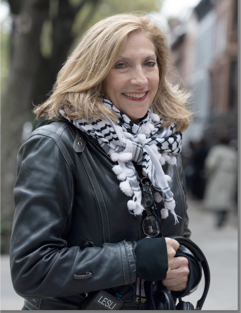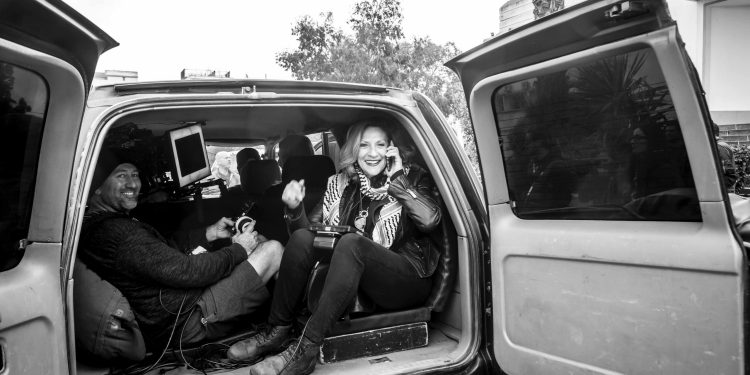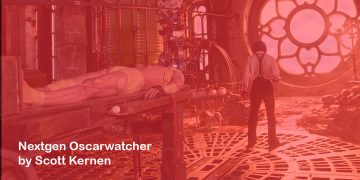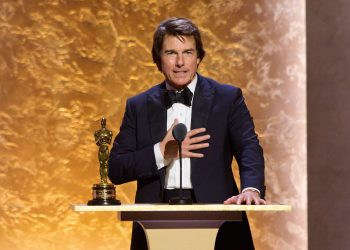Celebrated director Lesli Linka Glatter boasts over three decades of marquee-brand television including Twin Peaks, NYPD Blue, Mad Men, The West Wing among many, many more. She loves complex characters thrown into thought-provoking situations and employs a delicate hand to guide her audiences through challenging material. Mad Men brought her first Emmy nomination and her first Directors Guild of America award, but it’s her multiple-season collaboration on Showtime’s Homeland that merited her highest acclaim. Glatter’s Homeland direction received another DGA award and five additional Emmy nominations.
 This year, Lesli Linka Glatter’s fifth Emmy nomination comes for her brilliant direction of the Homeland series finale, “Prisoners of War.” The episode eschews the tradition series finale tropes. No main character dies. There are no massive, Earth-shattering explosives. Instead, Glatter guides the episode through an emotionally explosive conclusion that celebrates the series-long relationship between Carrie Mathison (Claire Danes) and Saul Berenson (Mandy Patinkin). At Homeland‘s end, we’ve discovered – to use a cliche – the pupil has become the teacher, and we never saw it coming. Thank Glatter and the brilliant Homeland writers for such a graceful conclusion.
This year, Lesli Linka Glatter’s fifth Emmy nomination comes for her brilliant direction of the Homeland series finale, “Prisoners of War.” The episode eschews the tradition series finale tropes. No main character dies. There are no massive, Earth-shattering explosives. Instead, Glatter guides the episode through an emotionally explosive conclusion that celebrates the series-long relationship between Carrie Mathison (Claire Danes) and Saul Berenson (Mandy Patinkin). At Homeland‘s end, we’ve discovered – to use a cliche – the pupil has become the teacher, and we never saw it coming. Thank Glatter and the brilliant Homeland writers for such a graceful conclusion.
Here, Lesli Linka Glatter talks to Awards Daily about orchestrating the series finale and about the choices she made within the episode. She also reveals how Homeland has shifted her perception of our modern political environment. Finally, she talks about what’s next on deck once safe television production returns.
Awards Daily: First of all, congratulations on your Emmy nomination for directing the Homeland series finale. I know this must be bittersweet to say goodbye to Homeland after so long being such an integral part of the show.
Lesli Linka Glatter: It truly is. And thank you so much. I am still kind of stunned and very thrilled. I’m truly grateful because I would absolutely not be here if I didn’t have such an extraordinary team. As we know, we’re in a team sport, and I have been so grateful and lucky to be working with this amazing group of such talented people.
AD: Absolutely. So when you look at “Prisoners of War,” did you have certain notes that you wanted to hit in that episode that you influenced on the screenplay?
LLG: Well, Alex Gansa and Howard Gordon are amazing writers. Alex has been the showrunner on call the whole time, and he and Howard set up a working environment where it wasn’t about being the smartest person in the room but about being in the room with the smartest people. The best idea would win. They are such extraordinary writers, such deep thinking writers, that the scripts were always interesting and complicated. Yet, there was always a sense of whatever we can do to make it better that’s what we’ll do. So, it was an extraordinarily creative environment to be working in all these years. And one of the things that was so amazing to me as a director is that every season we re-invented the wheel. We reset the show in another country. It was always wonderful and challenging. But I think with the finale — which is a huge responsibility to be doing a series finale — the fact that the story came full circle, I think was very satisfying.
AD: Absolutely. One of the things I love the most about the finale was that it wasn’t about pyrotechnics. That there wasn’t some desire to be closing with a big explosion or someone dying dramatically. It felt very much in tone with the rest of the series. Obviously, it leaves the characters in a different place, and we’ll talk about that in a second. But the emotional pyrotechnics, I think, are what is so special about the episode. Particularly the last conflict between between Carrie and Saul. Obviously they’re building off of eight years of working together and that sense of shared history, but how do you as a director influence that scene to make it spark. That’s the best word I can find for it. It just sparks!
LLG: That means a lot to me because we’ve done a lot of that kind of pyrotechnics. And, you know, the show is based on so much research and feels realistically real, and there’s always this level of anxiety underneath everything in this world of political thriller. Yet, the core of the whole series is the relationship between Carrie Mathison and Saul Berenson. So, the last episode is so much about their relationship, the nature of the relationship, and the fact that they are both on opposing sides of a very powerful issue. Carrie feels she has to do what she’s doing, and Saul is completely committed to his path.
It ends in such an explosive way even though it’s quiet, as you say. But it’s also so much about the depth of their relationship. Of course, working with those two actors, with Claire Danes and Mandy Patinkin, I am the luckiest director on the planet. You know, these are actors that are fearless and will go anywhere. Working with them and digging deep into a scene with them are great examples of the incredible joy of what I’ve been able to be part of for all these years. That was their last scene that we shot, that whole sequence in the house. It was very moving and powerful that that was the end.
AD: What was the last scene that you shot?
LLG: The last shot of the series was Claire driving a car, which on many levels is hilarious because Claire Danes is nothing like Carrie Mathison. She is an amazing human being, but she is not a wonderful driver. She was born in New York City and driving is not one of her strong suits. She’s gotten better over the years, but it’s not one of her great skills. We were on an insert car, shooting in Los Angeles for the first time after returning from Morocco. So ironically, that’s where we ended. That’s where our final moments were. And, you know, weeping. Usually there’s no crying in baseball. Well, there was a lot of crying, I can tell you.
AD: So coming back to “Prisoners of War,” my personal favorite sequence of the episode is the sequence where Anna (Tatyana Mukha) has been made at the United Nations. She makes that terrible choice: she would rather die than give her life to the Russians who know that she’s a traitor. Talk to me about choosing to cut away at that moment away from Anna with the gun to her head to Saul’s reaction.
LLG: Ah, great question. Well, that scene is so intense because both characters have put themselves on the line for what they believe for their dedication to the mission. The fact that we cut away to Saul, who is the character we know and love, and the impact of losing his most important asset and relationship, other than Carrie Mathison, in that moment it lands on him and not her. I think that’s really powerful. I guess it would have been powerful to see, but the fact that he feels responsible and that he couldn’t protect her and that she was his most valuable asset other than Carrie is profound.
AD: Sure, absolutely. So, having directed episodes within eight seasons of Homeland, has that impacted the way that you view or understand real world politics?
LLG: Oh my goodness, absolutely. Because I don’t know if you know, but every year we as a team — Alex, Howard, all the writers, myself, and Mandy and Claire — go to DC and meet with the intelligence community. We literally meet with heads of CIA, NSA, DNI, State Department, Treasury, and journalists. Alex Gansa asked the question, ‘What keeps you up at night? What are your deepest fears?’ And that’s where the season comes from. So, it is based in this realistically real world. We always try to get opposing views, not just one view, so I think Homeland lives in the worlds of ambiguity, of shades of grey. There are no white hats or black hats.
Carrie and Saul’s scene in the series finale has that element of two characters with completely opposing views, and they’re both right. I think that’s one of the things we always wanted to look at. This season, we’re asking the question, ‘What has America learned since 9-11?’ What would it look like if we had another horrible incident (which we did not want to film on our own soil)? We created the case of a helicopter going down and a president being killed. Would we behave better? Would we get all the information? Or would we overreact like we did with 9/11? Also, how does America project itself overseas? How do we project our power overseas? These are really interesting questions to make.
AD: When you look back at this last episode and maybe to an extent the last season, what is one of the more challenging moments that you had to construct given all of those pieces that you’re working with? With all of those questions that you’re asking, what was the hardest thing to nail?
LLG: Oh, wow. All right. Also an excellent, excellent question. I think it was setting up the full circle of starting with Nicholas Brody, and him coming back as a hero, but was he a traitor? Now, Carrie Mathison is in that same position. Was she turned? We wanted to be sure we kept those questions going but also support the belief that she was still capable and doing her job. And that Saul took this incredible risk to send her in maybe before she was ready to do that. She was still in the process of getting her memory back after that incredible time being held as a prisoner.
Alex Gansa shared with me something someone wrote on the internet, a summation that was so smart: ‘Homeland began with a traitor masquerading as a hero and ended with a hero masquerading as a traitor.’ I thought what a great thing. I wish I could give credit to the person who said that, but that kind of summed up the last season to me in many ways. Of course, with all the politics going on with the Taliban and so forth, what happens if you have a leader who takes over who is both arrogant and ignorant and is not up to the task? [Both laugh… uneasily] Again, we are telling a narrative story. This is not a documentary. But what happens when you are placed in that situation?
AD: Talking about Nicholas Brody, you bring him back in the beginning of the series finale through the video that he had recorded, which I thought was a really nice touch. It took us back to the show’s roots and made us remember how far we’ve come across the series. It sets up that that brilliant summation of the series where we’ve got a traitor masquerading as a hero and a hero masquerading as a traitor. I love that. I’m glad that you read that to me.
LLG: I know! I wish I could give the person who wrote it credit. I hope they will appear because it was such a smart way of putting it together. But yes, I loved starting with Brody. Of course, there were so many rewrites on the last twenty pages of the script. Alex was reworking the whole time. He continued to rework until it truly landed in such a powerful way. I remember reading that final draft of the last twenty pages, and I can tell you we were getting perilously close to needing to shoot it. Like we were literally days away from having to film those last twenty pages. When I read that final draft, I was like, ‘Oh my god, it just landed for me.’
 AD: Yeah, it was a perfect ending. As you look back over your career of working with Homeland, what do you think that you have taken away to work on other projects, present or future?
AD: Yeah, it was a perfect ending. As you look back over your career of working with Homeland, what do you think that you have taken away to work on other projects, present or future?
LLG: Oh, my goodness, so much. First of all, get the best possible people around you at all times. In this team sport, you are only as good as your team. I think I knew that before, but I have been reminded of that big time with this. Also, you can create such a fantastic working environment having a ‘No Asshole’ policy. Always dig deeper, ask more, question more, want more in terms of how you tell the story. You don’t get a lot of these in a career where you have that mix of people. We’ve traveled the world together. We have been the traveling circus, and resetting or going to a different place or hiring a whole crew from that country or that state has been amazing. It’s never made the show get any easier.
You think by the time you’re on an eighth year of a show, you’ve got it dialed in. You’d think you can walk on the set and just start, but every year we’re starting over again. I think every year, we were always resetting, and that kept it fresh and exciting. I think hopefully we were always asking important questions about where we are as a country and where these characters are. There’s a lot that I’ll take everywhere for the rest of my life, and I miss all of our team. I really miss them.
AD: Do you ever envision another project such as a Homeland TV movie, or is this the perfect end note for you?
LLG: Well, that’s a difficult question. I don’t ever really want to say goodbye to them. I certainly never thought about continuing. We always decided this would be the last season. I knew that we wanted to go out when we felt the show was still really good and pertinent. I feel like Alex found such a great ending that put Carrie and Saul back together again but in such a different way, an unexpected way. That she would now be his asset in Moscow, and that they, again, are connected. But what an unusual connection! I actually think Carrie Mathison is as happy as she will ever be. I think she actually loves Yevgeny [Costa Ronin], and that level of deception she can live with. She’s able to do her job and fulfill her mission and have a relationship.
AD: It’s oddly kind of the perfect scenario for her despite being an American traitor.
LLG: That’s what’s so entertaining about it, which I, of course, love. I think Saul was so profoundly impacted by her betrayal and to find out that she was playing the long game. That one look on Mandy’s face when he realizes, and he looks up and it’s like, ‘Oh my god.’ Being on a set and watching an amazing actor so fulfill that moment is joyful.
AD: I can’t even imagine. It must give you goosebumps to even see it happening because you know that’s the shot. That’s it.
LLG: And I have to say the production designer had to come up with that book cover literally overnight.
AD: Wow! It’s such a brilliant device because it tells you so much about where Carrie is in the world and what’s going on with her. The title of her book alone tells you everything you need to know.
LLG: Yes. And the fact that she made the dedication to Frannie because that was such an unresolved piece that also hit me emotionally in a really deep way. I love being a storyteller. I love what I do. And I’m so grateful that I can continue doing it.
AD: So what’s next for you?
LLG: What’s next? Well, when we all went into quarantine, I had my four suitcases and three boxes packed, and I was headed to Budapest to start an 8-part miniseries for Amazon called The Banker’s Wife. One of our Homeland writers, Meredith Stiehm, is writing all eight episodes. I’m directing all eight, which sounds exhausting even before I’ve started but also exciting. We were beginning prep when we were all shut down. So, I think we will pick up as soon as we can. Budapest is in good shape now. So, hopefully crossing our fingers. Oh, and the show deals with the banks that do business with dictators and money launderers and drug runners and the wealthy and entitled.
AD: You like complex material. You like complex topics.
LLG: Yeah, I do. I like stories that have big, global kind of macro-political views, juxtaposed with interpersonal relationships and with complicated, layered characters. I like that combination.
AD: Excellent. Best of luck to you on that, and I hope hopefully you’re able to shoot safely very soon.
LLG: Yes, thank you. I’m looking forward to being back and telling more stories.
















